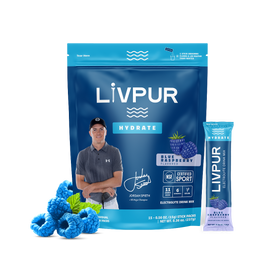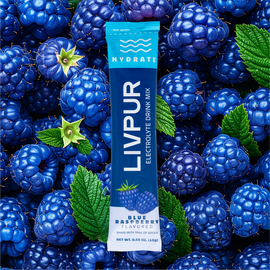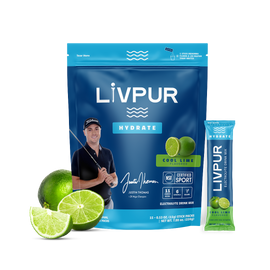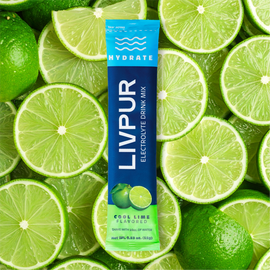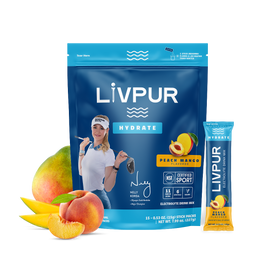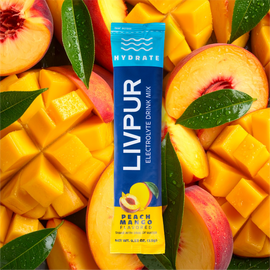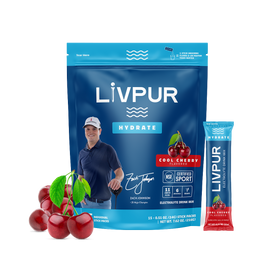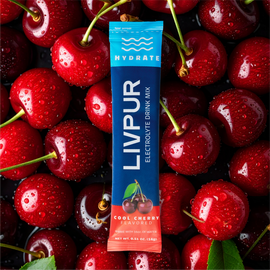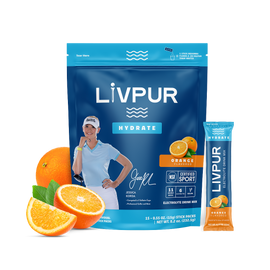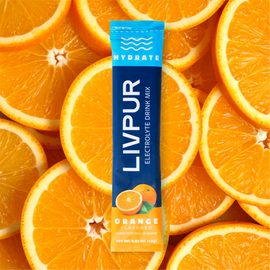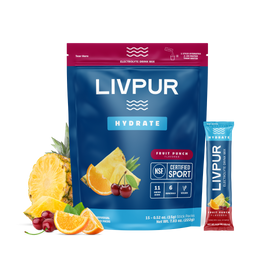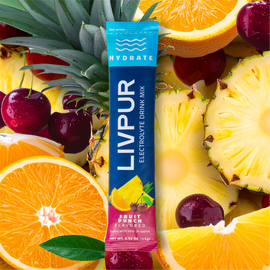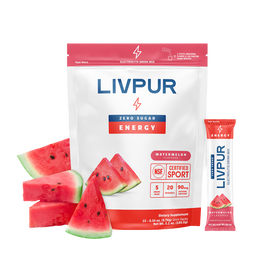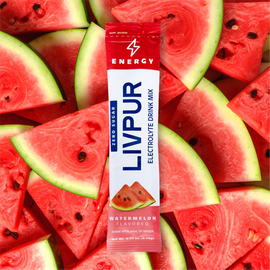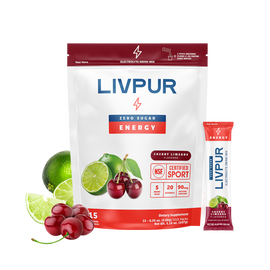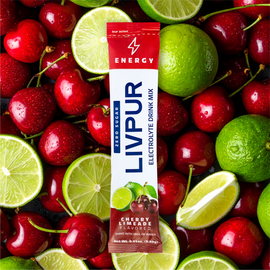November 08, 2023 • By Laura Onie • Blog
High Performance Hydration for Athletes
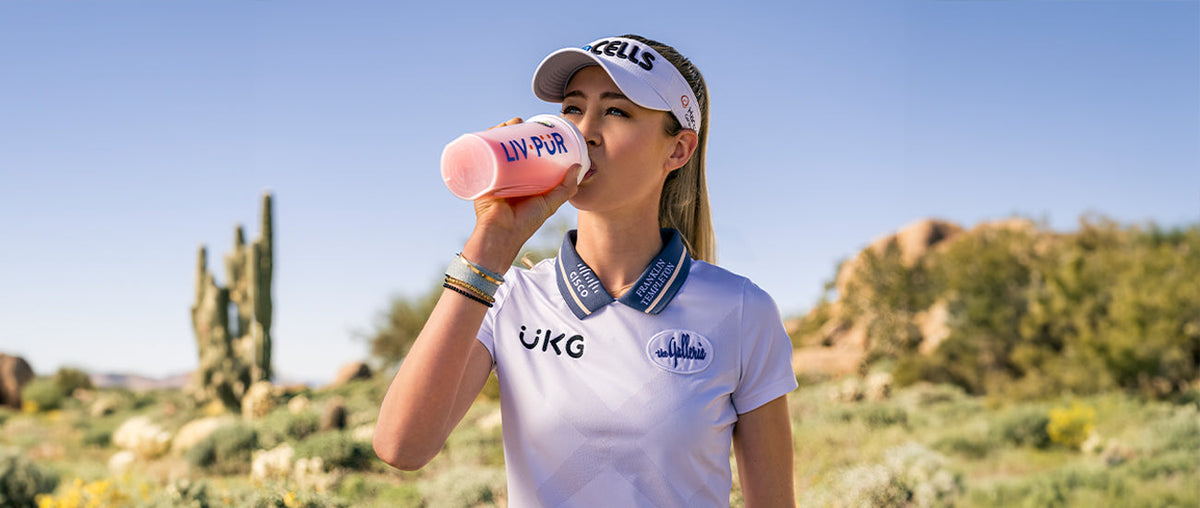
When you have to dig deep for that extra push, where does it come from? It all depends on how you approach sports nutrition, especially hydration.
What we consume and when impacts how long we’ll last on the floor or the field. It determines the precision and explosiveness of our movements. Most importantly, it affects whether or not we’ll be ready to do it all over again tomorrow.
How’s your hydration? Keep reading to find out where there’s room for improvement, if you need a performance drink, and what it means to be NSF-safe.
What is hydration in sports nutrition?
Hydration is the combination of adequate fluid intake and proper electrolyte replacement. Being well hydrated before, during, and after physical activity helps sustain energy levels and regulate body temperature.
It is also essential for circulation and blood pressure, ensuring that muscles (especially the heart) perform optimally for the duration of the session.
How do I know if I’m hydrated enough?
The easiest way to assess hydration is to check the color of your urine. It should be pale yellow. Any darker, and you need to hydrate.
It is also helpful to weigh yourself before and after practices, scrimmages, and general training. Compensate for every pound lost with one to 1.5 liters of fluid.
Besides that, athletes and fitness enthusiasts may need to increase hydration if they experience:
- Muscle cramping during or after workouts
- Tiring quicker than usual
- Reduced reflexes/coordination
- Headache
How does hydration affect athletic performance?
According to the U.S. Anti-Doping Agency, hydration is a top concern for athletes. Dehydration reduces the amount of blood circulating in the body, as less fluid makes it thicker. This makes athletes more susceptible to exhaustion and reduces the number of exercise byproducts flushed from the body.
Per the Agency, “Research has shown that losing as little as 2% of total body weight can negatively affect athletic performance. For example, if a 150-pound athlete loses three pounds during a workout or competition, their ability to perform at peak performance due to dehydration is reduced. Proper fluid replenishment is the key to preventing dehydration and reducing the risk of heat injury in athletes engaged in training and competition.”
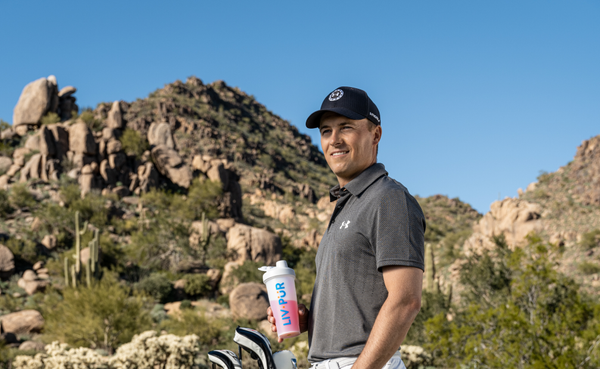
Hydration Goals for Athletes
If the fog and fatigue of mild dehydration are impeding your progress, begin addressing it with these three tips.
1. Start thinking of hydration as part of your diet.
Configuring daily caloric intake, portioning out protein and vegetables, adjusting macros as needed – athletes take diet seriously but often overlook how hydration fits into this.
For example, if sports drinks, alcohol, and fruit juices are included, they could be taking up too many calories, often in the form of added sugar. There’s always room for a protein shake, but in general, keep drinks low-calorie and strictly for hydration purposes.
Drink water before meals. It improves satiety, enforces portion control, and encourages electrolyte balance.
2. Get enough fluid and know when to add electrolytes.
Everyone’s needs will vary, but athletes are most likely going to require at least a few liters of water daily.
Make sure to carry a reusable water bottle and distribute fluids throughout the day, not all at once. Trying to meet your daily fluid intake in one go can throw off electrolyte balance.
If you’re working at high intensity or in higher temperatures, add an electrolyte mix to your water. Consuming this before and during your active times can prevent deficits in energy, focus, and muscle contraction.
3. Make hydration the first thing you do when you wake.
Drinking water on an empty stomach first thing in the morning stimulates healthy digestion and supports the metabolism. Some even say it helps them with heartburn and indigestion, as it reduces acidity in the stomach first thing in the morning.
Most importantly, drinking water first thing upon waking can help prevent common mild dehydration. If you enjoy lots of coffee in the morning, you might find that your urine does not get to the ideal, hydrated shade of pale yellow/clear before noon. Water before coffee gets ahead of this.

Energy for Athletes: Strategies for Performance
Hydration figures pretty heavily into energy, with fatigue being one of the first symptoms of dehydration. Complementing hydration with the following maximizes results for longer-lasting performance.
Eat as many of these foods as you can.
All food is energy, but some are better at boosting it than others. Include a few of these in your diet daily.
- Foods high in folate. This is a type of B vitamin that helps you use carbs as fuel. Dark leafy greens like kale, collard greens, and spinach are good sources of folate. Asparagus, Brussels sprouts, broccoli, and even oranges are pretty folate rich, too.
- Whole grains. Stable energy levels require stable blood sugar, and whole grains are the best carb for the job. You can always go gluten-free with quinoa, but oatmeal (steel cut is best) as well as whole grain brown rice are excellent picks also.
- Herbs and spices. These don’t often appear in sports nutrition guides, but they’re crucial. First, spices such as turmeric, along with many others, are a fantastic source of antioxidants. Cayenne can boost circulation for enhanced blood flow, on top of containing the natural analgesic capsaicin.
Spices and herbs also add flavor and variety to what can otherwise be a repetitive fitness-focused diet. This helps us stick with it longer.
Prioritize recovery.
Many of us are familiar with the Four R’s of Recovery: rehydrate, refuel, repair, and rest. All of these add up to renewed energy the next day. Here’s how to put it into practice:
Rehydrate: Even before your workout is through, use a hydration drink to replace lost electrolytes.
Refuel: Eat some carbohydrates to replenish the glycogen stores you used up during exercise.
Repair: Repair and refuel sometimes step on one another, as we need protein but also carbs. If you’re not going for a full meal post-exercise, choose a carbohydrate snack and a recovery drink mix that contains plenty of amino acids and antioxidants.
Rest: Sleep hygiene is also a frequently overlooked part of an athlete’s performance strategy. Turn off devices an hour before bed, keep the room cooler than you think, and aim for seven to eight hours of sleep.
Don’t consume all of your protein at once.
To grow, repair, or maintain, muscles need to be consistently fed throughout the day. Your exact targets may differ, but the general recommendation is to eat four to five 20- 30-gram servings of protein throughout the day.
Even distribution is a big part of this. You might think you’re already on it, but dietitians note that people tend to eat some protein at breakfast, a bit more at lunch, and then the bulk of their daily allotment at dinner.
Those more modest amounts aren’t as likely to stimulate muscle protein synthesis. That means that even if you do manage to hit your protein targets, you’re not getting out of it what you could.
Re-learn what you know about sport nutrition drinks.
Energy drinks and pre-workouts that give you the jitters are no longer the norm, just like sugary sports drinks aren’t the only way to hydrate.
Today’s top picks use natural caffeine in reasonable amounts, with plenty of amino acids – not just the BCAAs.
Natural caffeine is preferable because your body absorbs it more slowly for lasting performance. You’re also less likely to experience a crash this way.
Modern blends are also good at incorporating adaptogens and other nutrients that support a greater sense of wellbeing.
Supplementing as an Athlete: Why NSF Certified for Sport® Matters
Everyone needs to keep an eye on supplement safety and suitability, but athletes have special concerns.
The NSF's Certified for Sport® testing program helps confirm that sports supplements and sports nutritional products do not contain substances banned by athletic
organizations. They test for 280 stimulants, plus masking agents, diuretics, beta-2- agonists, and of course, steroids and narcotics.
This type of testing is part of what’s known as a third-party certification. Third-party certification means an unbiased source has reviewed a product for quality and accuracy in labeling. It puts particular focus on the manufacturing practices, and in the case of the NSF, means the product will be repeatedly monitored.
LivPur: Transparent, Accessible Sport Nutrition
It would be an understatement to say there’s a lot of information to sift through with respect to athletic supplementation and nutrition.
It’s not enough to get your protein; you have to distribute it evenly throughout the day. It’s not enough to drink plenty of water; you have to replace those electrolytes you’re sweating out, too.
LivPur formulas for hydration, energy, and recovery reflect years of research, experience, and expert advice. Every common challenge, from the stress response to immune function, matters in everyday performance. Address it with high-quality, third party tested blends that are nutrient-dense and contain no artificial flavors. And more important for athletes: it is NSF Certified for Sport®.
